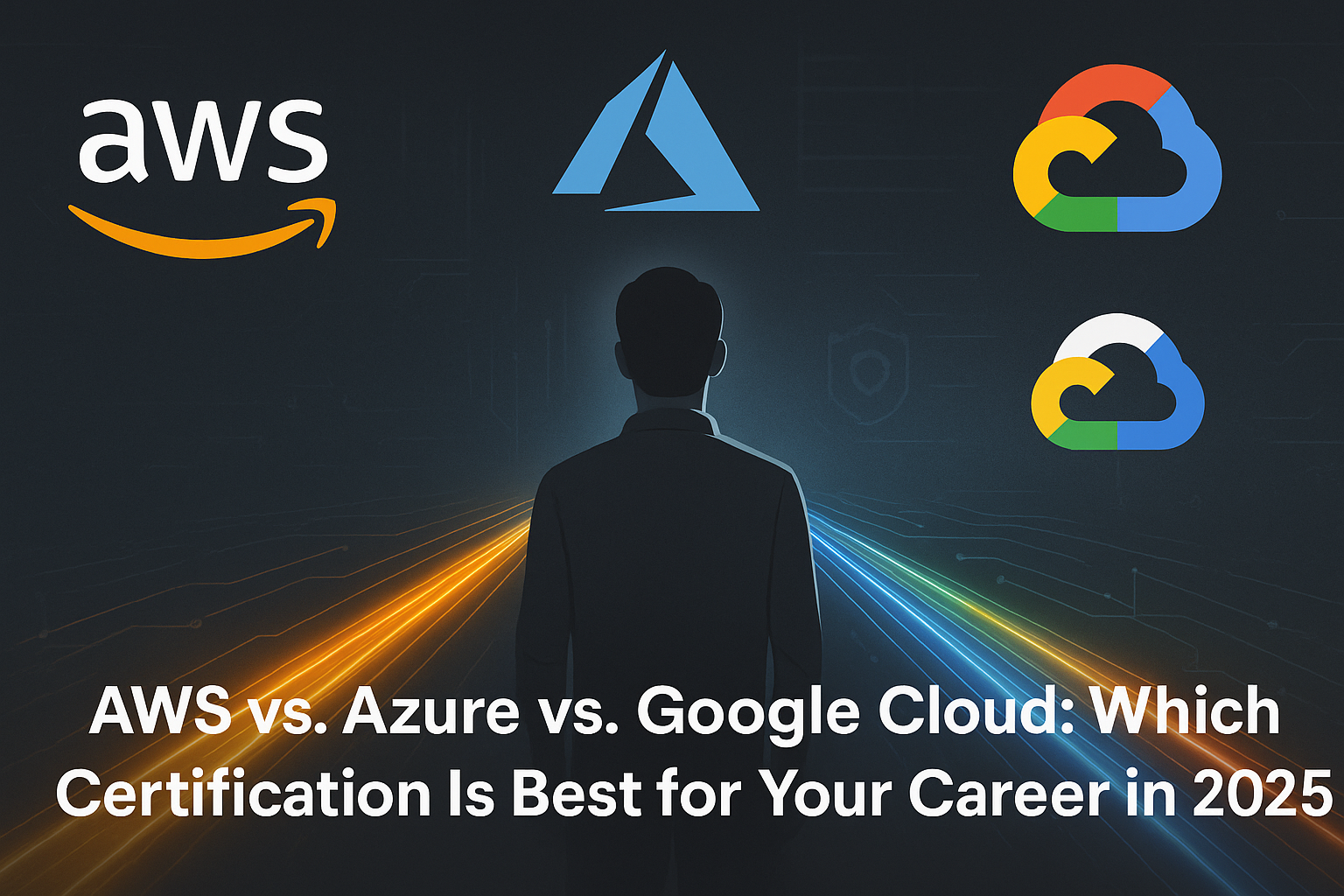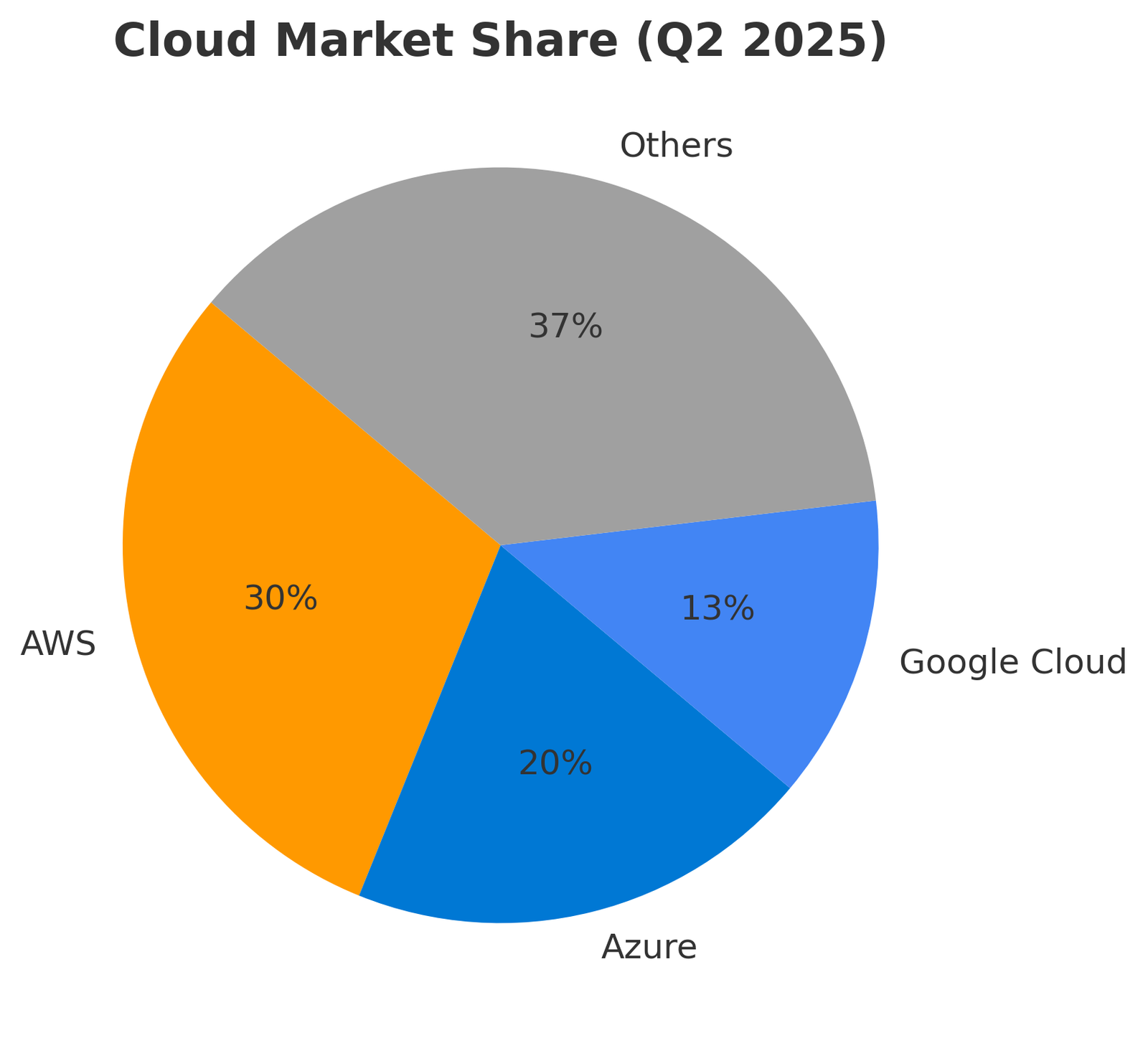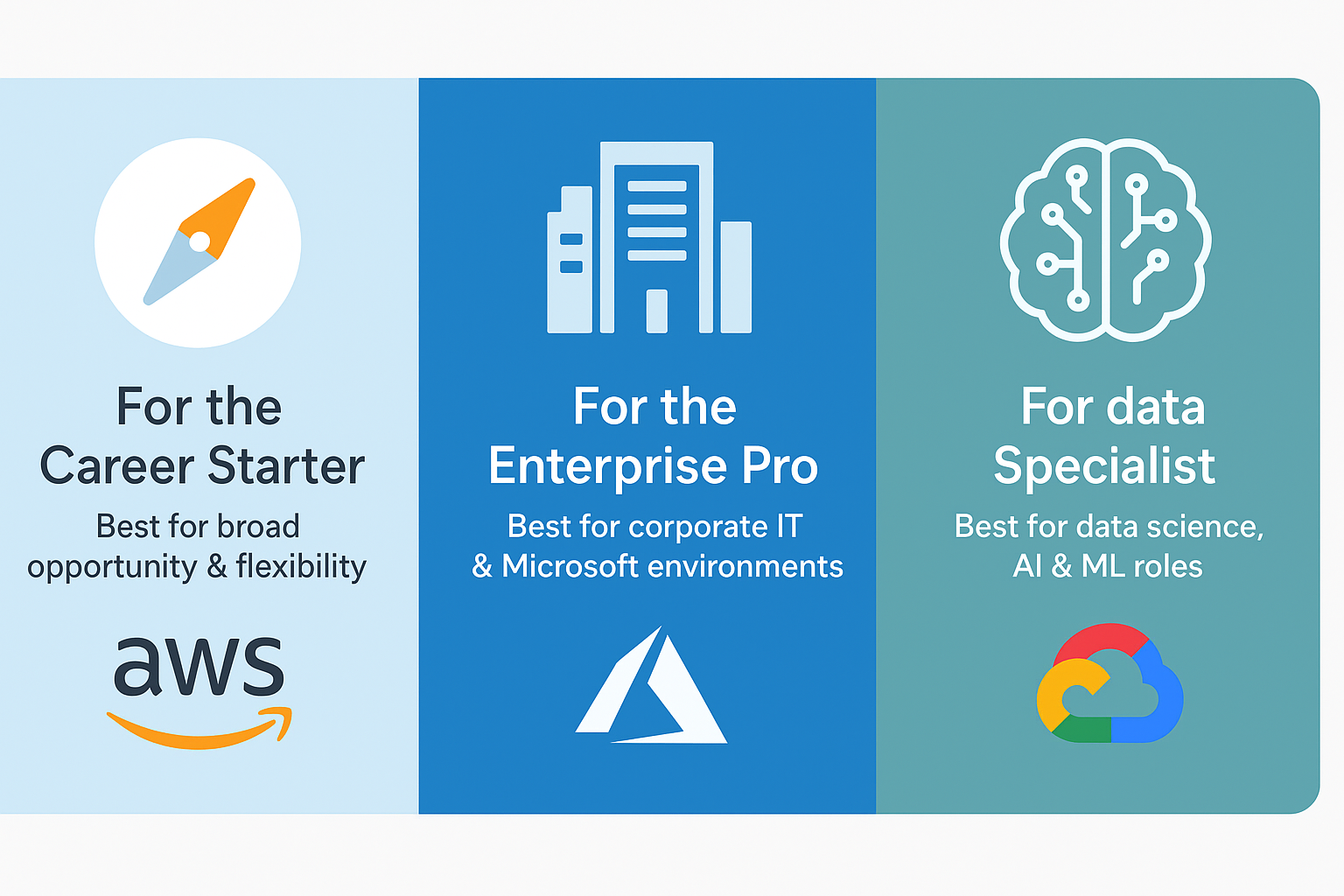The world runs on the cloud. In 2025, the cloud computing market isn’t just growing—it’s accelerating at a breakneck pace, largely fueled by the explosion in generative AI. With the industry projected to soar past $912 billion this year and on track to hit $1.6 trillion by 2030, this growth has kicked off a gold rush for skilled tech talent.
If you’re an IT professional, a recent grad, or looking to switch careers, this is a massive opportunity. But it also presents a tough choice. The cloud landscape is dominated by three titans: Amazon Web Services (AWS), Microsoft Azure, and Google Cloud (GCP). Deciding which certification path to follow is one of the most important career decisions you can make right now. It’s more than a technical choice—it’s an investment in a specific ecosystem and a bet on where the job market is headed.
This guide is here to help you make that decision. We’ll break down the market, demystify the certification roadmaps for each provider, and look at the hard data on job demand and salary potential. The goal isn’t to tell you which cloud is “best,” but to help you answer a much more important question: which cloud is best for you?
Why a Cloud Certification Is Your Next Big Career Move
Before picking a platform, it helps to understand just how big the opportunity is. Getting a cloud certification isn’t just about adding a line to your resume; it’s a strategic move that responds directly to what’s happening in the job market. In today’s tech landscape, a respected cloud credential offers one of the clearest and most immediate returns on investment.
A Market Measured in Trillions
The cloud market’s growth is both massive and relentless. Projections show the industry climbing from around $753 billion in 2024 to over $912 billion in 2025. This isn’t a market that’s slowing down. With a powerful growth rate of 17-21% annually, it’s on a clear path to reach between $1.6 trillion and $5.1 trillion by the early 2030s.
What’s driving this incredible acceleration? The biggest factor is the integration of Artificial Intelligence (AI) and Machine Learning (ML) into everyday business, with the cloud providing the raw power these technologies need. This AI boom, along with the global expansion of data centers and the rise of multi-cloud strategies, has made cloud skills essential. With over 94% of companies now using the cloud, knowing your way around it has gone from a nice-to-have skill to a core requirement.
The Skills Gap Is Your Opportunity
This rapid growth has created a strange problem: a massive and growing skills gap. Even as companies pour money into cloud services, a staggering 90% of them report a shortage of IT skills, a gap that could cost trillions in lost productivity.
Employers are no longer looking for people who just know one platform. They need professionals with sophisticated skills in multi-cloud architectures, security, and—most importantly—the combination of cloud engineering and AI. The line between a “cloud engineer” and an “AI specialist” is blurring fast. With 55% of organizations planning to roll out new AI solutions (nearly all of them on the cloud), this talent vacuum is your golden ticket. A certification is the clearest way to prove you have the skills to fill these high-value roles.
The Real-World ROI
A cloud certification translates directly into a bigger paycheck and more job opportunities. Studies consistently show that getting a new IT certification leads to an average salary increase of around $13,000, with cloud and cybersecurity credentials leading the pack.
In today’s job market, certifications can be more valuable than traditional degrees because they signal up-to-date, practical knowledge. For a hiring manager, a certification shows you’re committed, skilled, and ready to contribute from day one. This gives you a major competitive edge and a degree of job security in an otherwise volatile industry. The numbers don’t lie: top-tier certifications like the AWS Certified Security – Specialty can lead to jobs with average salaries over $203,000, while the Google Cloud – Professional Cloud Architect often pays above $190,000.
The Titans of the Cloud: A Look at the 2025 Market
Before you can pick the right certification, you need to know the players. The cloud market is a three-way race between tech giants, and each has its own personality, market position, and set of strengths. These differences directly shape the job opportunities available in each ecosystem.
Market Share: Who’s Winning?
The cloud infrastructure market is a clear three-horse race. Together, the “Big Three” control over 63% of the global market, leaving little room for anyone else.
Amazon Web Services (AWS) is still the king of the hill, a position it’s held since it basically invented the industry. Microsoft Azure has cemented itself as the powerful number two, using its massive enterprise customer base to fuel its growth. Google Cloud (GCP) is the third-place challenger, known for its deep technical expertise in fast-growing fields. While AWS has the biggest piece of the pie, Azure and GCP are growing faster, meaning the competition is fierce—especially as generative AI creates new opportunities.
Strengths and Strategies
Beyond the numbers, each platform has a unique vibe that attracts different customers and, in turn, different job roles.
AWS: The Original and Most Comprehensive
As the market creator, AWS’s biggest advantage is its sheer size and scope. It offers the most services and features, covering almost any use case you can imagine. This has made it the go-to choice for everyone from tiny startups to global giants like Netflix and NASA. For job seekers, this means AWS has the most job openings, the most learning resources, and a massive community for support. An AWS certification is often seen as the most versatile and recognized credential, making it a safe and powerful choice for a general cloud career.
Microsoft Azure: The Enterprise Powerhouse
Azure’s rapid growth comes from a simple, brilliant strategy: leveraging its existing dominance in the business world. For the millions of companies already using Microsoft products like Windows Server, Office 365, and Active Directory, choosing Azure is a no-brainer. This seamless integration makes it the top choice for large corporations, government agencies, and regulated industries like finance and healthcare. Azure has also become a leader in the hybrid cloud space, helping companies connect their on-premises data centers to the cloud. If you have a background in Microsoft tech, an Azure certification is a natural and often very profitable next step.
Google Cloud (GCP): The Data and AI Specialist
Google Cloud doesn’t try to be everything to everyone. Instead, it focuses on being the best in a few high-value areas. Built on the same infrastructure that powers Google Search and YouTube, GCP’s strengths lie in data analytics, machine learning, AI, and container orchestration with Kubernetes (which Google invented). Services like BigQuery and Vertex AI are considered best-in-class, making GCP the top platform for data scientists, ML engineers, and data analysts. A GCP certification signals specialized, cutting-edge expertise and often leads to premium salaries in data-focused roles.
A Closer Look: AWS Certification Paths
Choosing AWS means aligning with the market leader. You’ll have access to the widest range of jobs and a mature ecosystem of training materials and community support. It’s a great choice if you’re looking for flexibility and a broad set of career options.
Your AWS Roadmap for 2025
AWS structures its certifications in a clear path, from foundational knowledge to deep, specialized expertise. The program is designed to validate skills for specific job roles, with a recent focus on creating clear paths into data and AI.
Foundational Level
This is the starting line, perfect for anyone—technical or not—who needs to understand the basics of the AWS Cloud.
- AWS Certified Cloud Practitioner (CLF-C02): Covers the essentials of AWS services, security, and pricing. No tech experience is needed.
- AWS Certified AI Practitioner (AIF-C01): A newer cert that covers the basics of AI/ML and how to use them on AWS.
Associate Level
This is the most popular tier, where you prove you have hands-on technical skills for a specific role. AWS suggests having about a year of experience for these.
- AWS Certified Solutions Architect – Associate (SAA-C03): The flagship certification, focused on designing scalable and cost-effective solutions on AWS.
- AWS Certified Developer – Associate (DVA-C02): For developers, this covers building, deploying, and debugging cloud-native apps.
- AWS Certified SysOps Administrator – Associate (SOA-C02): Aimed at system administrators and DevOps pros, this focuses on management and operations.
- AWS Certified Data Engineer – Associate (DEA-C01): A specialized path for data pros, focused on building and managing data pipelines.
- AWS Certified Machine Learning Engineer – Associate (MLA-C01): Validates skills in deploying and maintaining ML models on AWS.
Professional Level
This expert tier is for those with two or more years of experience designing and troubleshooting complex solutions on AWS.
- AWS Certified Solutions Architect – Professional (SAP-C02): The top certification for architects, requiring advanced design skills.
- AWS Certified DevOps Engineer – Professional (DOP-C02): Validates expertise in automating and managing distributed systems on AWS.
Specialty Level
These certifications prove you’re a subject matter expert in a specific area, like Advanced Networking (ANS-C01), Security (SCS-C02), or Machine Learning (MLS-C01).
AWS Career Outlook & Salaries
AWS’s market leadership means strong salary potential. The AWS Certified Solutions Architect – Associate is a great starting point, often leading to roles paying over $120,000. Professional and Specialty certs can push your salary even higher.
A Closer Look: Microsoft Azure Certification Paths
Getting an Azure certification is a smart move if you’re targeting a career in the enterprise world. Because Azure integrates so well with existing Microsoft products, it’s the go-to platform for large corporations, government agencies, and regulated industries. Skills in Microsoft Entra ID (formerly Azure Active Directory) are especially valuable for IT support, admin, and security roles.
Your Azure Roadmap for 2025
Microsoft’s certifications are role-based, meaning they’re designed to prove you have the exact skills needed for a specific job. This gives you a clear path from certification to career.
Fundamentals Level
This is the entry point for beginners or non-technical folks. These certifications never expire.
- AZ-900: Microsoft Azure Fundamentals: Covers the basics of cloud concepts, Azure services, and security. It’s the best place to start if you’re new to Azure.
- AI-900: Microsoft Azure AI Fundamentals: Focuses on the basics of AI and machine learning concepts within Azure.
- DP-900: Microsoft Azure Data Fundamentals: Covers core data concepts and how they’re implemented with Azure services.
Associate (Role-Based) Level
This is the heart of the Azure program, where you validate your skills for a specific job. Microsoft suggests having about six months of hands-on experience.
- Azure Administrator Associate (AZ-104): One of the most popular certs, it validates skills in managing Azure identities, storage, compute, and networks.
- Azure Developer Associate (AZ-204): For developers who build and maintain cloud apps on Azure.
- Azure Security Engineer Associate (AZ-500): Focuses on implementing security controls and managing identity on Azure.
- Azure Data Engineer Associate (DP-203): For data pros who design and implement data storage and processing solutions.
- Azure AI Engineer Associate (AI-102): Validates skills in building and deploying AI solutions using Azure’s AI services.
Expert (Role-Based) Level
This is the top tier for seasoned pros with deep expertise. You usually need an Associate-level cert first.
- Azure Solutions Architect Expert (AZ-305): The premier certification for architects, validating expertise in designing complex cloud and hybrid solutions on Azure.
- DevOps Engineer Expert (AZ-400): For professionals who combine people, processes, and technology to deliver valuable products continuously.
Azure Career Outlook & Salaries
Azure’s strong enterprise adoption fuels a healthy job market with great salaries. Certified professionals often report a 10-15% bump in pay compared to their non-certified peers. Roles like Azure Solutions Architect are particularly well-paid, often commanding six-figure salaries.
A Closer Look: Google Cloud (GCP) Certification Paths
Think of Google Cloud as the specialist’s choice. Choosing GCP is a strategic move to focus on the cutting-edge fields of data, analytics, AI, and containerization. While GCP has a smaller market share, its technical excellence in these areas makes its certifications a powerful way to stand out, often leading to highly specialized and top-paying jobs. Expertise in a tool like BigQuery can be a huge career booster for data analysts and engineers.
Your GCP Roadmap for 2025
GCP’s certification program is structured in tiers, similar to AWS, guiding you from foundational concepts to advanced, role-based expertise.
Foundational Level
This level is for anyone who needs to understand the basics of cloud and what Google Cloud offers. No technical background is required.
- Cloud Digital Leader: Validates your knowledge of cloud concepts and how Google Cloud can help businesses.
- Generative AI Leader: A new certification that covers the fundamentals of generative AI on Google Cloud.
Associate Level
This is the main technical starting point, proving you have the skills to deploy and manage projects on Google Cloud. Google recommends about six months of hands-on experience.
- Associate Cloud Engineer: This core certification shows you can deploy apps, monitor operations, and manage solutions on Google Cloud. It covers the fundamentals of compute, storage, networking, and security.
Professional Level
This advanced tier is for experts with deep technical skills in specific job roles. These certifications are highly respected and typically require 3+ years of industry experience, including at least one year with GCP.
- Professional Cloud Architect: Often listed as one of the highest-paying IT certifications in the world, this validates your ability to design robust, secure, and scalable cloud solutions.
- Professional Data Engineer: A highly sought-after cert for data pros, this validates skills in designing and building data processing systems and ML models on GCP.
- Professional Machine Learning Engineer: For AI specialists, this certification validates expertise in building and productionizing ML models on Google Cloud.
- Other Key Professional Certs: Cloud DevOps Engineer, Cloud Security Engineer.
GCP Career Outlook & Salaries
A GCP certification, especially at the Professional level, is a signal of elite, specialized skill. This is why GCP certs consistently rank at the top of salary surveys. While there are fewer total GCP jobs compared to AWS or Azure, the demand for specialized GCP experts in data and AI is intense, creating a high-salary niche for certified professionals.
The Verdict: How to Choose the Right Path for You
After looking at the market and the different certification paths, it’s clear there’s no single “best” cloud certification. The right choice isn’t about the platform; it’s about matching the platform’s strengths to your background, career goals, and the industry you want to work in. Here’s a simple framework to help you decide.
Just Starting Out? The Best All-Around Certification
If you’re new to IT, a recent graduate, or just want the most versatile and widely recognized credential, your best bet is the AWS Certified Solutions Architect – Associate.
Why? It comes down to the numbers. AWS’s market dominance means it has the most job postings, giving you the widest net to cast in your job search. The AWS ecosystem is also the most mature, with a massive amount of free and paid training materials and community support—a huge plus when you’re starting from scratch. The Solutions Architect – Associate certification also gives you a great overview of core cloud concepts that you can apply to any platform later on.
Already in Enterprise IT? The Smoothest Transition
If you’re an experienced IT pro—like a system admin or network engineer—working in or targeting large companies, the most strategic path is the Microsoft Azure Administrator Associate (AZ-104).
This is because Azure rules the enterprise world. You’re likely already working in a Microsoft environment, using tools like Windows Server and Active Directory (now Microsoft Entra ID). Azure integrates seamlessly with these tools, making the learning curve much gentler. Plus, the demand for Azure skills in the corporate sector is booming, and some say the market for experienced Azure engineers is less saturated than for AWS, which could give you an edge.
A Data Scientist or AI Specialist? The Innovator’s Choice
If your career is all about data—data scientist, data analyst, AI/ML engineer—the most powerful choice is the Google Cloud Professional Data Engineer or Professional Machine Learning Engineer.
This decision aligns with GCP’s clear technical leadership in data and AI. Google was built on managing and analyzing data at a planetary scale, and that DNA is baked into its cloud services. Tools like BigQuery for analytics and Vertex AI for machine learning are simply best-in-class. While there are fewer total GCP jobs, the roles are highly specialized and command top-tier salaries. A professional-level GCP certification in data or ML makes you stand out as an elite expert in the hottest part of the cloud market.
A Developer or DevOps Engineer? It Depends on the Stack
For developers and DevOps engineers, the choice is a bit more nuanced.
- AWS Certified Developer – Associate or DevOps Engineer – Professional is the go-to for the broad cloud-native world, especially startups and tech companies that love AWS’s huge toolbox.
- Azure DevOps Engineer Expert (AZ-400) is perfect for developers in the Microsoft ecosystem, especially those using.NET, Visual Studio, and GitHub.
- Google Cloud Professional Cloud DevOps Engineer is the top choice for Kubernetes-heavy environments. Since Google invented Kubernetes, its managed service (GKE) is the most mature and integrated, making it the platform of choice for container-focused organizations.
At-a-Glance Comparison
Future-Proofing Your Cloud Career
Getting your first certification is a huge step, but it’s not the finish line. The cloud industry moves incredibly fast, and long-term success means committing to lifelong learning.
The Rise of Multi-Cloud
Here’s a secret that top cloud professionals know: your career won’t end with just one cloud platform. Today, more than 94% of companies use a mix of different clouds to avoid being locked into one vendor, get the best services from each, and build more resilient systems.
This means that while mastering one platform is the right first step, the ultimate goal is to become multi-cloud fluent. The good news is that core cloud concepts—virtualization, networking, storage—are the same everywhere. Once you’re good at AWS, learning Azure or GCP is much easier. A professional who holds certifications from two of the “Big Three” is an incredibly valuable asset in today’s job market.
Keeping Your Certs Up-to-Date
Cloud certifications aren’t a one-and-done deal. To prove your skills are still current, you need to recertify. Each provider has a different policy, which is worth considering.
Azure’s one-year renewal cycle for its role-based certs stands out. While that might sound like a hassle compared to the multi-year validity of AWS and GCP certs, it’s actually a career advantage. The renewal is a free, online, unproctored assessment that keeps you sharp on the latest platform updates. For an employer, a recently renewed Azure cert is a strong signal that your skills are fresh.
The Golden Rule: Certs + Experience = Success
It’s important to remember that a certification is not a substitute for hands-on experience. Employers hire you to solve real-world problems. The most successful professionals are those who pair their certifications with a portfolio of projects. All three cloud providers offer generous free tiers, so you can build, deploy, and experiment without spending a lot of money. Building a few personal projects is the best way to solidify your knowledge and show a hiring manager what you can do.
Finally, don’t forget the soft skills. The best cloud professionals are great communicators who can explain complex ideas to non-technical people, collaborate with a team, and think critically to solve business problems.
Conclusion: Your Launchpad into the Cloud
The cloud computing revolution, now supercharged by AI, has created a job market filled with incredible opportunities. The demand for skilled, certified professionals has never been higher, and the rewards—in salary, job security, and career growth—are huge.
The debate over AWS, Azure, and Google Cloud isn’t about which is “best,” but which is the best fit for your career. AWS offers the broadest path with the most jobs. Azure is your direct route into the enterprise world. And Google Cloud is the top choice for specializing in the high-demand fields of data and AI.
The journey to certification takes work, but it’s an investment that will pay off for years to come. The time to pick your path, start learning, and build your future in the cloud is now.







[…] You are an expert in a specific public cloud: Amazon Web Services (AWS), Microsoft Azure, or Google Cloud (GCP). Cloud Engineer don’t just use the cloud; you architect solutions on it. You know which […]
[…] with Coursera. Focus on the Professional Certificates from Google, IBM, or Meta. The brand recognition is what you’re paying for, and it’s worth […]
[…] Platforms: Most AI runs on the cloud, so experience with AWS, Azure, or Google Cloud is a […]
[…] Google Career Certificates offer a low-risk, high-reward path into the tech industry. By using the free access methods, you can gain in-demand skills without taking on debt. […]